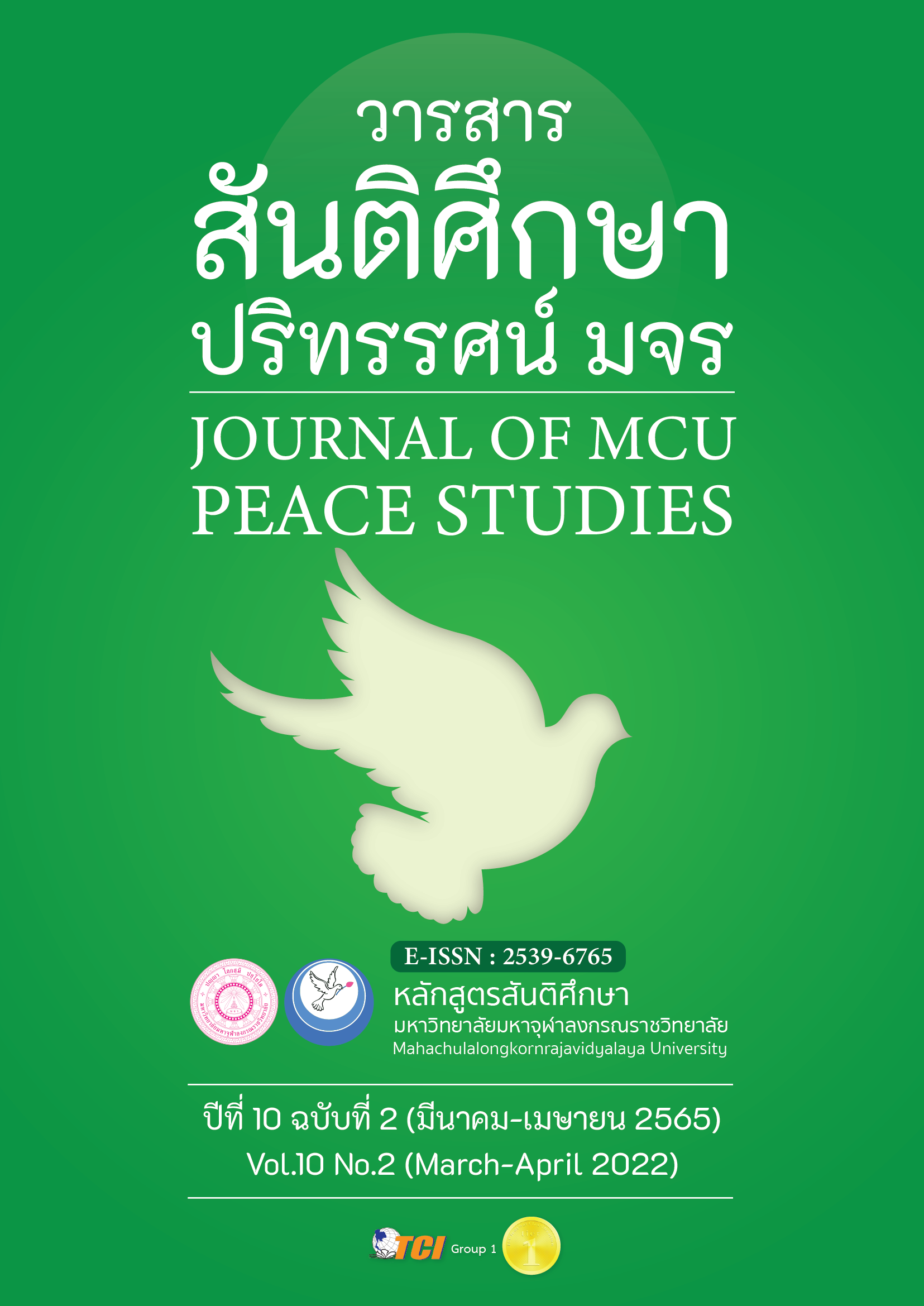บุพปัจจัยต่อการบริหารจัดการความรู้ที่ส่งผลต่อผลการดำเนินงาน ด้านนวัตกรรมของข้าราชการกรมสรรพากรในประเทศไทย
Main Article Content
บทคัดย่อ
การเปลี่ยนแปลงวิถีการดำเนินงานจากระบบราชการเป็นการสร้างผลการดำเนินงานด้านนวัตกรรม ด้วยดิจิทัลของกรมสรรพากร ส่งผลต่อข้าราชการในการปรับกระบวนการทำงานเพื่อปรับเปลี่ยนวัฒนธรรมองค์กร ดังนั้นบทความวิจัยนี้จึงมีวัตถุประสงค์เพื่อ 1) ศึกษาอิทธิพลของวัฒนธรรมองค์กร
การเรียนรู้ขององค์กร และบรรยากาศองค์กรต่อการบริหารจัดการความรู้ที่ส่งผลต่อผลการดำเนินงานด้านนวัตกรรมของข้าราชการกรมสรรพากร และ 2) ศึกษาเปรียบเทียบแนวคิดของข้าราชการรุ่นใหม่และ
รุ่นเก่าต่อผลการดำเนินงานด้านนวัตกรรม ใช้เทคนิคการวิจัยแบบผสม เก็บข้อมูลเชิงปริมาณด้วยแบบสอบถามจากข้าราชการกรมสรรพากร 687 คน ประมวลผลด้วยการวิเคราะห์ตัวแบบสมการโครงสร้าง เก็บข้อมูลเชิงคุณภาพด้วยการสัมภาษณ์เชิงลึกข้าราชการ 15 คน ใช้วิธีการวิเคราะห์แบบอุปนัย เพื่อสนับสนุนผลการวิจัยเชิงปริมาณและเปรียบเทียบความคิดเห็นตามกรอบแนวคิดการวิจัย
ผลการศึกษาพบว่า 1) วัฒนธรรมองค์กรมีอิทธิต่อการบริหารจัดการความรู้และผลการดำเนินงานด้านนวัตกรรม 2) การเรียนรู้ขององค์กรและบรรยากาศองค์กรมีอิทธิพลต่อการบริหารจัดการความรู้และผลการดำเนินงานด้านนวัตกรรม และ 3) การบริหารจัดการความรู้มีอิทธิพลต่อผลการดำเนินงานด้านนวัตกรรม ผลการศึกษาความคิดเห็นของข้าราชการระดับอำนวยการสูง พบว่า สอดคล้องกับผลการวิจัยเชิงปริมาณตามกรอบแนวคิดการวิจัย ผลการเปรียบเทียบความคิดเห็นของข้าราชการรุ่นใหม่และรุ่นเก่า พบว่า มีความคิดเห็นสอดคล้องกันตามกรอบแนวคิดการวิจัยและมีความเห็นเพิ่มเติมว่า 1) การมีส่วนร่วมในการแลกเปลี่ยนเรียนรู้ของข้าราชการรุ่นใหม่และรุ่นเก่าในลักษณะรุ่นพี่สอนรุ่นน้องช่วยลดเวลาในการเรียนรู้และลดช่องว่างด้านนวัตกรรม 2) การมีความสัมพันธ์ที่ดีระหว่างเพื่อนร่วมงานและผู้บังคับบัญชาเป็นบรรยากาศที่สนับสนุนการเรียนรู้และการสร้างนวัตกรรมขององค์กร
Article Details

อนุญาตภายใต้เงื่อนไข Creative Commons Attribution-NonCommercial-NoDerivatives 4.0 International License.
ทัศนะและความคิดเห็นที่ปรากฏในบทความในวารสาร ถือเป็นความรับผิดชอบของผู้เขียนบทความนั้น และไม่ถือเป็นทัศนะและความรับผิดชอบของกองบรรณาธิการ ยินยอมว่าบทความเป็นลิขสิทธิ์ของวารสาร
เอกสารอ้างอิง
business performance in healthcare industry. Procedia-Social and Behavioral
Sciences, 8(58), 683-692.
Best, J. W., & Kahn, J. V. (1995). Research in education (7th ed.). New Delhi, India: Prentice
Hall of India.
Cavaliere, V., & Lombardi, S. (2015). Exploring different cultural configurations: how do they
affect subsidiaries’ knowledge sharing behaviors?. Journal of Knowledge
Management, 19(2), 141-163.
Chang, C. L., & Lin, T. C. (2015). The role of organizational culture in the knowledge
management process. Journal of Knowledge Management, 19(3), 433-455.
Diamantopoulos, A. & Siguaw, A. D. (2000). Introducing LISREL: A guide for the uninitiated.
London: Sage Publications.
Gao, S., Yin, F., Chen, J., & Guo, Y. (2019). The mechanism of inter-organizational
collaboration network on innovation performance: Evidences from east coastal
enterprises in China. Journal of Coastal Research, 94(Suppl.), 945-949.
Gomes, G., & Wojahn, R. M. (2017). Organizational learning capability, innovation and
performance: Study in small and medium-sized enterprises (SMES). Journal of
Business Management, 52(2), 163-175.
Hair, J. F., Black, W. C., Babin, B. J., & Anderson, R. E. (2014). Multivariate data analysis
(7th ed.). Essex, UK: Pearson Education.
Hosseini, S. S., Tekmedash, Y. N., Karami, A., & Jabarzadeh, Y. (2019). The impact of
knowledge management strategy on service innovation performance in private and
public hospitals. Iranian Journal of Management Studies, 12(1), 1-24.
Jain, A. K., & Moreno, A. (2015). Organizational learning, knowledge management practices
and firm’s performance: An empirical study of a heavy engineering firm in India. The
Learning Organization, 22(1), 14-39.
Lashari, R. H., Alvi, A. K., & Farooq, H. M. U. (2016). The impact of organizational climate on
knowledge management in banking sector of Lahore, Pakitsan. Science International,
28(5), 81-86.
Levy, S., & Lemeshow, S. (2008). Sampling of populations: Methods and applications.
New York: John Wiley & Sons.
Llopis, O., & Foss, N. J. (2016). Understanding the climate-knowledge sharing relation: The
moderating roles of intrinsic motivation and job autonomy. EMJl, (2)34, 135-144.
Naserinajafabady, R., Rangriz, H., & Mehrabi, J. (2013). Effects of organizational culture,
structure and strategy on organizational effectiveness by using knowledge
management case study: Seven international transportation company. IRJABS,7(6),
355-361.
Parveen, S., Senin, A. A., & Umar, A. (2015). Organization culture and open innovation:
A quadruple helix open innovation model approach. IJEFI, 5(1), 335-342.
Prasith-rathsint, S. (2012). Research methodology in social sciences (15th ed.). Bangkok:
Samrada.
Revenue Department. (2019a). Revenue Department strategic plan 2020-2022. Retrieved
September 10, 2020, from http://download.rd.go.th/fileadmin/download/ plan/
rdplan2020-2022.pdf
Revenue Department. (2019b). The Revenue Department announcement D2RIVE
strategy. Retrieved September 10, 2020, from https://www.rd.go.th/publish/
fileadmin/user_upload/news/news09_2562_edit.pdf
Rovinelli, R. J., & Hambleton, R. K. (1977). On the use of content specialists in the
assessment of criterion referenced test item validity. Dutch Journal of Educational
Research, 2(2), 49-60.
Schumpeter, J. A. (1934). The theory of economic development: An inquiry into profits,
capital, credit, interest and the business cycle. MA: Harvard Economic Studies.
Sirisamphan, T. (2017). Government 4.0 with innovation and government entrepreneurs.
Retrieved September 10, 2020, from https://www.dpe.go.th/manual-files-
401291791810
Thy, N. T. A. (2018). The influence of climate on organizational innovation: A study in
Vietnam. International Journal of Management and Applied Science, 4(2), 95-99.
Uddin, Md. A., Luo, F., & Das, A. K. (2017). A study of the impact of transformational
leadership, organizational learning, and knowledge management on organizational
innovation. Management dynamics, 16(2), 42-54.
Waheed, A., Miao, X., Waheed, S., Ahmad, N., & Majeed, A. (2019). How new HRM practices,
organizational innovation, and innovative climate affect the innovation performance
in the IT industry: A moderated-mediation analysis. Sustainability, 3(11), 1-21.
Waribugo, S., Ofoegbu, W., & Akpan, E. (2016). The impact of knowledge management on
product innovation of manufacturing firms in Nigeria. JIKM, 6(6), 78-87.


